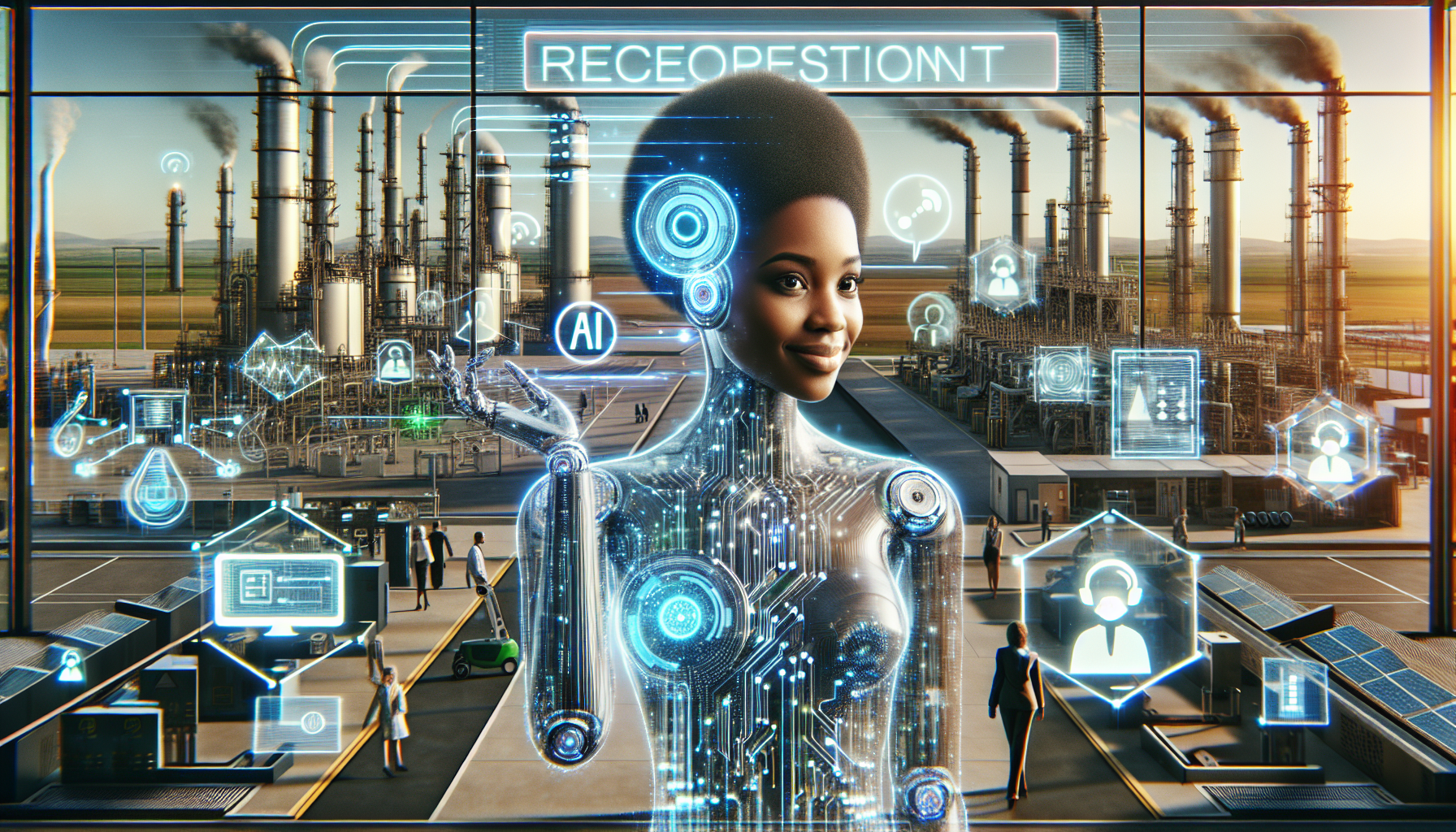
The energy sector, always at the creative frontier of innovation, now embarks upon a new journey of customer communication enhancement through AI Receptionists. This latest technological spurt, an amalgamation of artificial intelligence and automation, is transforming the landscape of customer service and making strides across a plethora of industries. In this respect, the energy sector, known for its prodigious dynamicity, is no exception.

AI Receptionists are automated systems powered by artificial intelligence technology designed to interact with customers. In the energy sector, these AI-driven receptionists play a vital role in improving customer communication by providing round-the-clock service, consistent responses, and quick resolution of client queries. These virtual receptionists embody the marriage of efficiency and customer satisfaction, enhancing the overall service quality of the energy sector.
With the help of machine learning and natural language processing, AI Receptionists can understand, learn, and respond to customer queries in a timely and coherent manner. This capability not only ensures smooth and uninterrupted communication but also cultivates a sense of reliability and rapport with the customer. In an industry like energy, where customer communication often involves technical and complex dialogue, having AI Receptionists can drastically improve the accuracy and ease of communication.
Besides enhancing consumer communication, the incorporation of AI Receptionists in the energy sector also aids in improving operational efficiency. By handling customer interactions, AI Receptionists liberate employees from the repetitive and mundane aspects of their jobs, thereby enabling them to focus on more complex and pertinent tasks. This operational efficiency obtained through AI Receptionists can go a long way in boosting productivity and profitability in the energy sector.
In conclusion, the advent of AI Receptionists in the energy sector marks a significant step towards streamlining customer communication and improving operational efficiency. As this technology continues to evolve, the potential advantages and benefits it promises will only grow more substantial and impactful. Ai receptionists are no longer a fanciful prediction of the future; they are a present reality, transforming the way the energy sector communicates with its customer base.
Traditional receptionist roles in the energy sector have seen innovative and exciting advancements lately, thanks to the rise of Artificial Intelligence (AI). One significant application of this technology lies in the development of AI-powered receptionists, designed to streamline customer communication. A primary advantage of these automated assistants is their seamless integration capacity with pre-existing customer service systems. This integration is essential in improving the flow and automation of data in any energy sector business.
One particularly effective integration tool is Zapier. This online platform enables the connection of AI receptionist software to various other applications used within a company's existing customer service structure. This compatibility allows for an automated flow of customer data between systems, enhancing efficiency and streamlining operations.
The integration of these AI receptionists, using tools such as Zapier, not only improves business operations but also contributes to a more sophisticated customer communication environment. Such streamlined automation allows for high-quality and consistent customer interaction, virtually eliminating the possibility of miscommunication due to human error. Companies in the energy sector equipped with this AI receptionist integration can expect time-efficient, accurate, and enhanced communication experiences for their customers.
Moreover, through machine learning capabilities, these AI receptionists can evolve over time. In other words, they have the ability to learn from past interactions and continually upgrade their skills and responses over time. As such, they continually contribute to the development of a more effective and efficient customer communication strategy.
Overall, the emergence of AI receptionists offers a promising leap in the enhancement of customer communication within the energy sector. By easing the integration process with already existing systems, these innovative solutions provide a pathway to a more streamlined, efficient, and effective customer-centric strategy.
In the rapidly evolving energy sector, AI Receptionists are revolutionizing customer communication. The transformative capability of these innovative solutions lies in their capacity for real-time data handling and interaction, enhancing customers' experience, and improving service delivery.

AI Receptionists, powered by advanced technology, can instantaneously process and respond to customer queries and requests. Traditional human receptionists can be slowed by an overload of interactions, which can lead to inefficient and frustrating customer experiences. Conversely, AI Receptionists are equipped to manage high volumes of interactions swiftly and accurately, reducing the potential for human error.
Their utility is further leveraged when combined with other tenets of digital transformation. For instance, integrating AI Receptionists with Customer Relationship Management (CRM) systems can result in a truly personalized customer service system, recognizing each customer's history and preferences to deliver customized responses.
The energy sector, in particular, can tap into this interconnected data reservoir to provide more relevant responses to each customer's specific energy needs. As a result, customers can get real-time updates about their energy consumption, service disruptions, and optimal usage based on energy management algorithms.
These advantages allow customers in this sector to communicate more efficiently, with immediate access to the data they need. Consequently, they are empowered to make informed decisions swiftly, enhancing their overall interaction and satisfaction with energy providers.
``` Please note that the image tag has been used to suggest the placement of relevant images. I believe these images would paint a vivid picture of the possibilities and advantages of deploying AI Receptionists in the energy sector.Three key players in the energy sector have successfully integrated AI Receptionists into their customer communication channels, setting remarkable precedents for the industry. The incorporation of AI technology in the form of virtual receptionists not only automated repetitive tasks but also augmented the customer service experience overall.
Enel Energy successfully deployed a multilingual AI Receptionist, thereby providing an omnichannel, 24/7 customer support. This helped in significantly reducing service response times and improving customer satisfaction. The receptionist has been trained in multiple languages and dialects, ensuring that no customer gets left behind based on linguistic differences. Enel’s case showcases the extensive linguistic capabilities of AI receptionists beyond regular office hours.
BP Global integrated an AI receptionist to address customer queries more promptly while also collecting valuable customer data in the process. BP's AI receptionist makes use of both text and speech recognition to interact with customers, thereby providing a personalized user experience. The receptionist also keeps track of the patterns in customer queries, aiding in analytics and future business direction. This case study signals the multifunctional benefits of AI receptionists, with their role not just limited to customer interaction but extending to data collection and analysis as well.
In an attempt to digitalize its operations, Shell introduced an AI receptionist to manage appointments and handle inquires which successfully reduced the need for human intervention. They highlighted that this reduction in manual input created room for their human staff to focus on more specialized tasks, thereby improving productivity. Shell's case study serves as a reminder that AI receptionists can free up personnel for other critical tasks, generating significant productivity gains.
These case studies augur well for the transformational impact of AI Receptionists in the energy sector, showcasing an array of benefits ranging from customer satisfaction and productivity improvements to strategic analytical insights. With continuous advancements in AI technology, such success stories are only expected to multiply.
As the energy sector evolves, emerging trends promise to bolster the adoption and functionality of AI receptionists. Futuristic technologies such as enhanced natural language processing (NLP), smart home integration, and advanced machine learning algorithms will not only add a new paradigm of customer interaction but also drastically streamline energy management and communication.

In the linguistic realm, for instance, improvements in NLP will expand the comprehension range of AI receptionists, enabling them to better understand complex customer queries and handle real-time information such as energy consumption data, outage reports, and billing inquiries. Moreover, augmenting current AI receptionist with sentiment analysis could further increase their empathetic understanding, enabling them to deliver more personalized customer service experiences.
Another noteworthy trend is smart home integration. As smart meters and home energy management systems become more mainstream, integrating AI receptionists could yield a mutually beneficial relationship. This will enable end-to-end communication, seamless problem reporting, and fault prediction, all leading to more reliable and efficient energy utilization.
In terms of AI development, adopting advanced machine learning algorithms holds significant future potential. By leveraging deep learning and predictive modeling, AI receptionists can be empowered to provide accurate energy usage predictions, contributing to effective energy management and conservation.
Overall, these future trends hint at a new era of innovation in the energy sector, with Artificial Intelligence at the forefront of reshaping customer communication.
In recent years, we've seen a steady maturation of AI technology in the energy sector. The significant benefits and transformative impact cannot be overemphasized. AI receptionists have proven to be a game-changer in enhancing customer communication. They help manage engagement with customers, allowing for prompt, accurate and personalized responses to inbound inquiries.
AI receptionists' increasing acceptance in the energy sector is driven by their ability to provide 24/7 customer support, cost-effectiveness, and potential to streamline processes. As a result, there is an overall improvement in customer service and increased operational efficiency.
Looking forward, we foresee an even more sophisticated use of Artificial Intelligence in customer communication. AI receptionists potentially could be leveraged to resolve intricate customer queries, manage appointments, and offer key energy-related insights. This could give room for real-time communication, even in linguistically diverse clientele base, buttressing the role of AI in encouraging globalization.
Furthermore, the future will likely see AI elevating its role in data analysis to further improve energy services. It will draw on vast swathes of customer interaction data, identifying patterns, predicting customer behavior, and providing actionable insights for improved decision-making.
In conclusion, adapting AI receptionists in the energy sector can make the industry more customer-friendly. It is a critical part of a broader digital transformation journey, which every progressive energy company should embrace. Taking the early steps to adapt and incorporate AI receptionist technologies will, therefore, help energy companies stay ahead of the innovation curve and continually enhance their customer service quality.
Start your free trial for My AI Front Desk today, it takes minutes to setup!








